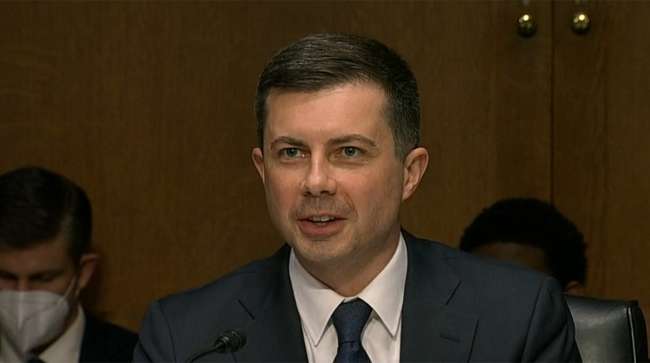Senior Reporter
Buttigieg Defends Infrastructure Law’s Implementation Before US Senate Panel

[Stay on top of transportation news: Get TTNews in your inbox.]
Provisions approved in the country’s premier federal infrastructure law will alleviate supply chain bottlenecks and assist the economy, the U.S. Secretary of Transportation told a Senate panel March 2.
A day after President Joe Biden declared in his State of the Union the nation was embarking on an “infrastructure decade,” Secretary Pete Buttigieg reassured Senate policymakers that newly approved transportation programs will enhance freight connectivity.
Tucked in the $1 trillion Infrastructure Investment and Jobs Act is nearly $500 billion for surface transportation-centric projects to pursue better access at freight hubs, advance new technologies and improve severe-weather resilience along mobility networks.
“As I’ve traveled across the country, I’ve seen supply chains straining, bridges out of service and critical infrastructure destroyed by increasingly frequent climate disasters. The need for major investment has long been clear, and now, this president and this Congress have delivered the means to address that need,” Buttigieg told the Environment and Public Works Committee. “The investments now underway will strengthen our goods movement and supply chains.”
Responding to freight industry concerns, Biden tapped Buttigieg and senior officials to assist the private sector on supply chain matters. Higher prices for certain goods have been attributed to bottlenecks at the ports.
In the weeks following the infrastructure law’s enactment, the U.S. Department of Transportation notified the public of new rounds of funding for highway projects, safety programs, transit connectivity and infrastructure grants.
For instance, the department recently announced $25 million for the Marine Highway Program, which is designed to expand navigable waterways. The funding is meant to respond to supply chain woes expected to continue throughout the year. The funds stem from the IIJA.
At the Senate hearing, the secretary also defended the Federal Highway Administration’s perspective about an aspect of the law’s implementation. Republican critics of the agency’s viewpoint cited a Dec. 16 memorandum that suggested states prioritize existing highway assets over expansion projects.
Buttigieg told senators, “As we go forward implementing the law, we would not impose any such mandate.”
Sen. Shelley Moore Capito (R-W.Va.), the committee’s ranking member, shared her consternation over the FHWA memo.
Want more news? Listen to today's daily briefing above or go here for more info
“The memorandum seeks to restrict the flexibility of states and impose one-size-fits all solutions to address the surface transportation needs of all communities,” she said. “It discourages states from moving forward with projects that add highway capacity and instead prioritizes projects that improve existing surface transportation assets, attempts to direct funding to assets not owned and operated by state departments of transportation, and focuses on projects that advance the administration’s priorities regardless of whether those projects meaningfully address the needs of a particular state or community.”
Last month, Capito, Senate Republican Leader Mitch McConnell of Kentucky, and other Republican senators raised similar concerns with the secretary over the FHWA memo.
“The provisions of the IIJA were carefully negotiated and reflect the input of both parties, the Biden administration and the broader stakeholder community,” the Republican senators wrote. “We urge recognition of the legislative process used to develop the IIJA and adherence to congressional intent as FHWA moves forward with implementing this historic legislation.”
Democrats, for the most part, took to praising the infrastructure law’s implementation. Committee Chairman Tom Carper (D-Del.), an advocate for funding to tackle climate change, said: “Americans see their elected leaders in Washington picking partisan battles that don’t achieve tangible results. By enacting this once-in-a-generation investment in our nation’s infrastructure, we demonstrated that bipartisanship is not only possible but essential.”
He added, “This new law is already beginning to grow our economy, create additional good-paying jobs and make a positive impact on so many lives. It’s a major win for which we should all be proud. I am, and I know that other members of this committee are as well.”




